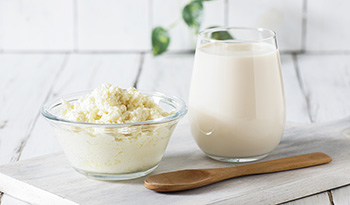Grapefruit Seed Extract: Unlock Immune, Cardiovascular, + Digestive Benefits

Grapefruit seed extract is derived from the seeds, pulp, and white membrane of grapefruit (Citrus × paradisi). Grapefruit seed extract contains a wide range of antioxidants. While it has been used primarily as an antimicrobial agent, grapefruit seed extract may also affect the immune, cardiovascular, and digestive systems.
Active Compounds in Grapefruit Seed Extract
Beyond antioxidants, grapefruit seed extract contains various chemical compounds that contribute to its potential health effects. The primary constituents of grapefruit seed extract include:
- Citrus bioflavonoids: These natural antioxidants found in citrus fruits are known for their ability to scavenge free radicals that can damage cells, reducing oxidative stress. This may reduce inflammation and promote proper immune system function.
- Polyphenols: Grapefruit seeds are rich in polyphenolic compounds like quercetin, rutin, naringin, and naringenin, which exhibit anti-inflammatory and antioxidant properties.
- Vitamin C: Grapefruit seed extract contains vitamin C, which plays a crucial role in immune function and skin health.
- Vitamin E: Grapefruit seed extract also contains vitamin E in the form of tocopherols, which act as antioxidants in the body, helping to reduce oxidative stress.
Antimicrobial Benefits
Antimicrobial activity is one of grapefruit seed extract’s most widely recognized health effects. Researchers have investigated grapefruit seed extract’s potential to inhibit the growth of various bacteria, fungi, and even some viruses.
1. Antibacterial Effects of Grapefruit Seed Extract
Several studies suggest grapefruit seed extract may be effective against common bacterial pathogens, including Escherichia coli, Staphylococcus aureus, Candida albicans, and Salmonella spp. One study found that grapefruit seed extract exhibited significant antibacterial activity against both gram-positive and gram-negative bacteria. The researchers attributed this antimicrobial effect to the presence of polyphenols and flavonoids in grapefruit seed extract, which can disrupt the bacterial cell membrane and interfere with their growth and replication.
Another study comparing the effects of grapefruit seed extract to conventional topical antibiotics found that grapefruit seed extract compared favorably to conventional medications in its ability to inhibit microbial growth.
A more recent study confirmed that grapefruit seed extract inhibited the growth of multidrug-resistant bacteria, including methicillin-resistant Staphylococcus aureus (MRSA). This study found that grapefruit seed extract inhibited bacterial growth even at low concentrations, which supports its use as a natural antimicrobial agent.
This extract may also help prevent or treat urinary tract infections. One small study investigated grapefruit seeds as a potential treatment for urinary tract infection with Pseudomonas bacteria. Another study found that both grapefruit seed extract and grapefruit juice had antimicrobial effects on urinary bacteria from the bladder and catheters.
2. Antifungal Effects of Grapefruit Seed Extract
Grapefruit seed extract has also been shown to exhibit antifungal properties. Several research studies suggest that grapefruit seed extract can inhibit the growth of fungal species, including Candida. A more recent study found that grapefruit seed extract prevented the development of fungal biofilms on dental resin.
3. Grapefruit Seed Extract’s Effects on Biofilms
Biofilms are complex, structured communities of microorganisms, including bacteria, fungi, and sometimes even viruses, that adhere to surfaces and produce a matrix of substances to protect themselves from immune system cells. These biofilms play a significant role in human health, as they can form on various surfaces within the body, such as teeth, medical implants, and mucosal tissues like the digestive tract lining.
Biofilms are notorious for causing chronic infections, as they shield pathogens from the immune system and antibiotics. Grapefruit seed extract is commonly used as a “biofilm buster” along with other natural substances like N-acetylcysteine and serrapeptase.
4. Antiviral Effects of Grapefruit Seed Extract
Another study found grapefruit seed extract interfered with the replication of certain avian (bird) viruses. The researchers noted that grapefruit seed extract may be an effective disinfectant in animal husbandry.
However, grapefruit seed extract’s antimicrobial effects have been called into question because of preservatives used in some formulations, which may be exerting an antimicrobial effect of their own. While initial results involving pathogenic bacteria and fungi are promising, more research is needed to confirm grapefruit seed extract’s antimicrobial properties.
Antioxidant Benefits
Grapefruit seed extract is packed with antioxidant compounds like polyphenols, bioflavonoids, and vitamin C. Antioxidants help combat oxidative stress, a process implicated in various chronic diseases and aging. Flavonoids derived from grapefruit seed extract, like naringin, naringenin, rutin, and quercetin, are powerful antioxidants. The high vitamin C content in grapefruit seed extract also contributes to its antioxidant effects. Vitamin C is a well-known antioxidant that supports the immune system, promotes collagen synthesis for skin health, and protects cells from damage caused by free radicals.
Naringin and naringenin, two antioxidant compounds found in grapefruit seed extract, have been studied as potential therapeutic agents for the cardiovascular system. Preclinical research has found these antioxidants may benefit the heart and blood vessels.
The antioxidant compounds in grapefruit seed extract may also improve immune system function. Vitamin C is essential for immune function because it supports the production of white blood cells like B cells, which produce antibodies and play a vital role in defending the body against infections.
While vitamin C is unquestionably beneficial for the immune system, grapefruit seed extract may also owe its immune-boosting effects to high amounts of flavonoids and polyphenols. These compounds may also enhance immune system function by reducing inflammation and oxidative stress.
Recently, grapefruit seed extract has also been studied as an additive for food and food packaging, as it reduces oxidation and increases the shelf life of foods.
However, it is important to note that while grapefruit seed extract exhibits antioxidant activity in lab studies and preclinical trials, its effects on the human body may differ due to individual bioavailability and metabolism.
Digestive System Benefits
Grapefruit seed extract’s antimicrobial and antioxidant effects may also benefit the digestive system. In a recent animal model study, grapefruit seed extract reduced tissue damage in acute pancreatitis. Researchers attribute this to its antioxidant properties. In another study investigating the effects of alcohol and stress on stomach lining cells, grapefruit seed extract had a protective effect. While these results have not yet been confirmed in human participants, the results are intriguing and warrant further research.
Irritable Bowel Syndrome (IBS) is a gastrointestinal disorder characterized by symptoms like abdominal pain, bloating, diarrhea, and constipation, often linked to an imbalance in gut bacteria. IBS is often treated with peppermint oil, probiotics, and glutamine. Because grapefruit seed extract has antibacterial properties, it may help restore microbial balance in the gut, potentially alleviating some symptoms of IBS.
In one clinical trial investigating the effects of grapefruit seed extract in people with both eczema and irritable bowel syndrome, participants who took encapsulated grapefruit seed extract noted significant improvements in IBS symptoms like bloating and gas over the course of the study.
Grapefruit Seed Extract Side Effects
While grapefruit seed extract offers numerous potential health benefits, like all substances, it may not be safe for everyone and may cause side effects. Grapefruit seed extract may cause skin rashes, itching, or digestive discomfort in individuals who are sensitive or allergic to citrus fruits.
Grapefruit seed extract may also interact with certain medications like blood thinners, antihypertensives, statins, hormonal birth control, and immunosuppressants. It inhibits cytochrome P450 enzymes in the liver, which play a role in drug metabolism. This can potentially lead to harmful increases in blood levels of some medications. Individuals taking prescription medications should consult their healthcare provider before using grapefruit seed extract supplements.
Some individuals may experience digestive discomfort, such as nausea or diarrhea, when consuming grapefruit seed extract in high doses. It is always advisable to start with a lower dose and gradually increase the dose to assess tolerance. Because grapefruit seed extract can alter bacterial growth, taking it long-term may impact the gut microbiota. Consult a healthcare provider when taking this supplement for more than a few days.
There are no studies investigating the use of grapefruit seed extract in pregnant or nursing women, so it is not recommended to use this supplement if you are pregnant or nursing.
Finally, there have been reports of grapefruit seed extract products being adulterated with synthetic antimicrobial agents, such as benzalkonium chloride, which may be harmful when ingested. Always choose reputable brands and consult a healthcare professional before using grapefruit seed extract supplements.
Use and Takeaways
Grapefruit seed extract can be used topically and internally as an encapsulated liquid. Dosing ranges from 100 to 250 milligrams per dose, taken one to four times daily based on the recommendation of your healthcare provider.
Grapefruit seed extract has a variety of potential health benefits, including antimicrobial, antioxidant, and immune-boosting properties. While some scientific evidence supports the claims about grapefruit seed extract’s effects, few clinical trials investigating its role in the human body exist. Despite a lack of studies, many healthcare providers have used grapefruit seed extract successfully. Always consult a knowledgeable healthcare provider before using grapefruit seed extract as a dietary supplement.
References:
- Reagor L, Gusman J, McCoy L, Carino E, Heggers JP. The effectiveness of processed grapefruit-seed extract as an antibacterial agent: II. Mechanism of action and in vitro toxicity. J Altern Complement Med. 2002;8(3):333-340.
- Han HW, Kwak JH, Jang TS, Knowles JC, Kim HW, Lee HH, Lee JH. Grapefruit Seed Extract as a Natural Derived Antibacterial Substance against Multidrug-Resistant Bacteria. Antibiotics (Basel). 2021 Jan 18;10(1):85.
- Tsutsumi-Arai C, Takakusaki K, Arai Y, Terada-Ito C, Takebe Y, Imamura T, Ide S, Tatehara S, Tokuyama-Toda R, Wakabayashi N, Satomura K. Grapefruit seed extract effectively inhibits the Candida albicans biofilms development on polymethyl methacrylate denture-base resin. PLoS One. 2019 May 28;14(5):e0217496.
- Krajewska-Kułak E, Lukaszuk C, Niczyporuk W. Ocena wpływu 33% ekstraktu z grejfruta na wzrost grzybów drozdzopodobnych, dermatofitów i pleśni [Effects of 33% grapefruit extract on the growth of the yeast--like fungi, dermatopytes and moulds]. Wiad Parazytol. 2001;47(4):845-9.
- von Woedtke T, Schlüter B, Pflegel P, Lindequist U, Jülich WD. Aspects of the antimicrobial efficacy of grapefruit seed extract and its relation to preservative substances contained. Pharmazie. 1999;54(6):452-456.
- Oyelami OA, Agbakwuru EA, Adeyemi LA, Adedeji GB. The effectiveness of grapefruit (Citrus paradisi) seeds in treating urinary tract infections. J Altern Complement Med. 2005 Apr;11(2):369-71.
- Osungunna MO, Onawunmi GO. Anti-adhesion and antibiotic modulatory evaluation of grapefruit (Citrus paradisi) juice and seed extract on bacteria isolated from urine and catheter. Journal of Pharmacy & Pharmacognosy Research. 2016;4(1):25-38. ISSN 0719-4250.
- Komura M, Suzuki M, Sangsriratanakul N, Ito M, Takahashi S, Alam MS, Ono M, Daio C, Shoham D, Takehara K. Inhibitory effect of grapefruit seed extract (GSE) on avian pathogens. J Vet Med Sci. 2019 Mar 30;81(3):466-472.
- Kang ST, Son HK, Lee HJ, Choi JS, Choi YI, Lee JJ. Effects of Grapefruit Seed Extract on Oxidative Stability and Quality Properties of Cured Chicken Breast. Korean J Food Sci Anim Resour. 2017;37(3):429-439.
- Heidary Moghaddam R, Samimi Z, Moradi SZ, Little PJ, Xu S, Farzaei MH. Naringenin and naringin in cardiovascular disease prevention: A preclinical review. Eur J Pharmacol. 2020 Nov 15;887:173535.
- Dembinski A, Warzecha Z, Konturek SJ, Ceranowicz P, Dembinski M, Pawlik WW, Kusnierz-Cabala B, Naskalski JW. Extract of grapefruit-seed reduces acute pancreatitis induced by ischemia/reperfusion in rats: possible implication of tissue antioxidants. J Physiol Pharmacol. 2004 Dec;55(4):811-21.
- Brzozowski T, Konturek PC, Drozdowicz D, Konturek SJ, Zayachivska O, Pajdo R, Kwiecien S, Pawlik WW, Hahn EG. Grapefruit-seed extract attenuates ethanol-and stress-induced gastric lesions via activation of prostaglandin, nitric oxide and sensory nerve pathways. World J Gastroenterol. 2005 Nov 7;11(41):6450-8.
- Jade K. Grapefruit seed extract: uses and benefits. University Health News. 2013. Accessed September 15, 2023.
DESCARGO DE RESPONSABILIDAD:Este CENTRO DE BIENESTAR no pretende proporcionar diagnóstico...
















































































 Índice de contenidos
Índice de contenidos















